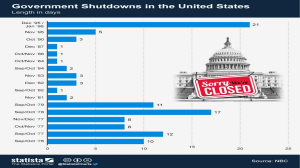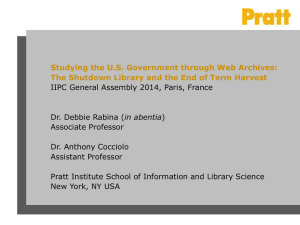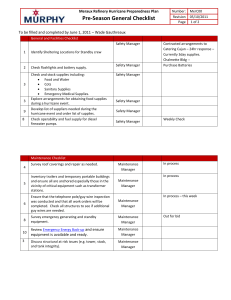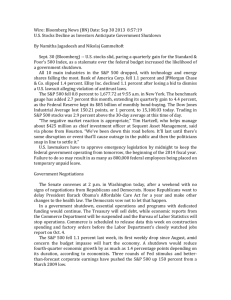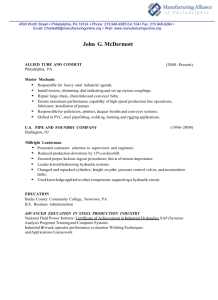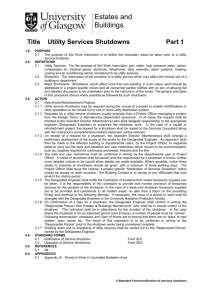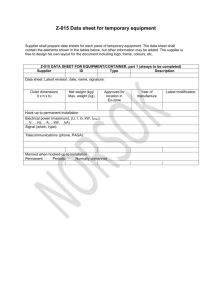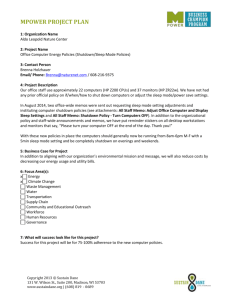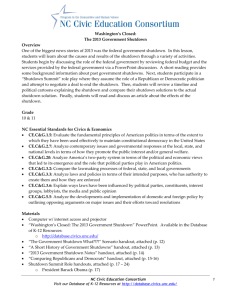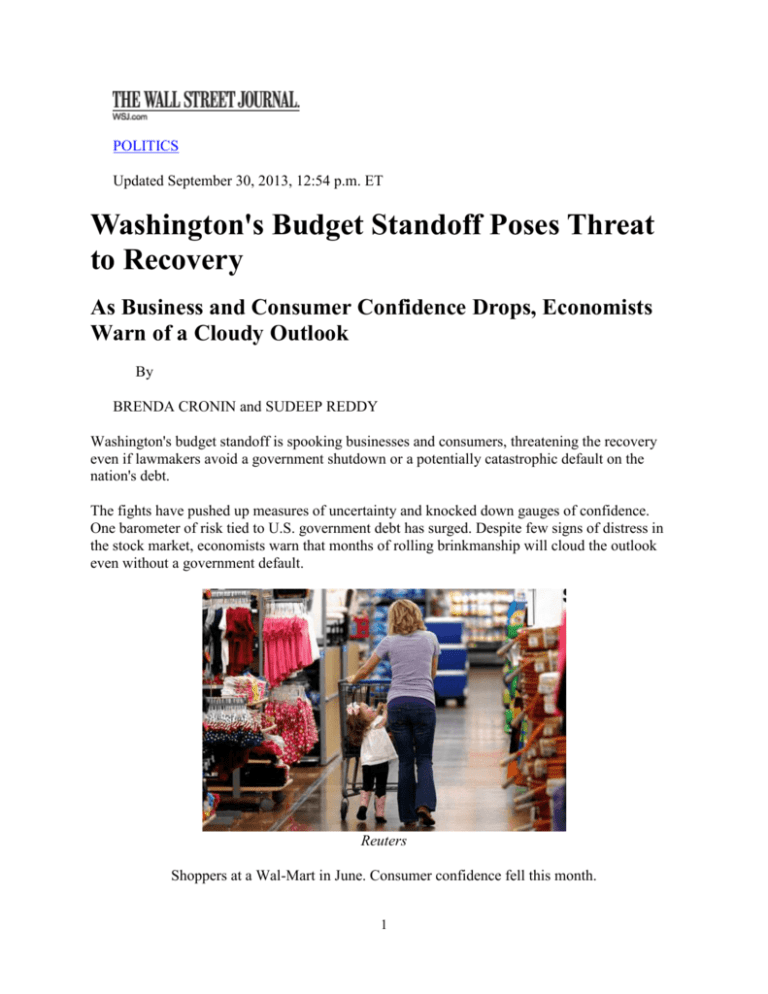
POLITICS
Updated September 30, 2013, 12:54 p.m. ET
Washington's Budget Standoff Poses Threat
to Recovery
As Business and Consumer Confidence Drops, Economists
Warn of a Cloudy Outlook
By
BRENDA CRONIN and SUDEEP REDDY
Washington's budget standoff is spooking businesses and consumers, threatening the recovery
even if lawmakers avoid a government shutdown or a potentially catastrophic default on the
nation's debt.
The fights have pushed up measures of uncertainty and knocked down gauges of confidence.
One barometer of risk tied to U.S. government debt has surged. Despite few signs of distress in
the stock market, economists warn that months of rolling brinkmanship will cloud the outlook
even without a government default.
Reuters
Shoppers at a Wal-Mart in June. Consumer confidence fell this month.
1
Washington's budget standoff is spooking businesses and consumers, threatening the recovery
even if lawmakers avoid a government shutdown or a potentially catastrophic default on the
nation's debt. Sudeep Reddy joins the News Hub. (Photo: Getty)
"American businesses have this mentality where no one wants to make a decision because you
have no idea what's lurking around the corner," said Jeremy Flack, president of Flack Steel, a
Cleveland steel distributor. "Government needs to make us feel more solid about the state of
affairs, and they're doing the exact opposite."
The congressional deadlock comes as the economy tries to gain traction more than four years
after the recession ended. Consumers are slowly improving household finances. Businesses are
boosting hiring at a modest pace. The housing market is regaining lost ground, and while the
Dow Jones Industrial Average and S&P 500 each fell more than 1% last week, the indexes aren't
far off their record highs. Most investors say they are more concerned with near-term decisions
about the Federal Reserve's bond-buying program than about news from Capitol Hill.
2
But confidence among U.S. consumers fell to a five-month low this month, according to a gauge
by the University of Michigan released Friday. Business confidence has dipped as well. A survey
by the Business Roundtable, a trade group for big-company CEOs, found half of top executives
said the budget fights were crimping their hiring plans.
"We want leaders to lead and compromises to be found, because not doing that would have a
serious impact on the economic growth of this country," the group's chairman, Boeing Co. CEO
Jim McNerney, said earlier this month.
On Friday, 236 business organizations—including the Business Roundtable and U.S. Chamber of
Commerce—wrote to lawmakers urging them to keep the government open, raise the federal
borrowing limit and pivot their attention to longer-run budget concerns such as entitlement
spending.
Fiscal warfare can harm the economy directly and indirectly. Cutting government services—
either temporarily in a shutdown, or permanently through spending reductions—can disrupt a
broad range of commerce and hit American workers and businesses tied to the public sector.
Indirectly, the annoyance from disruptions alongside the threat of damage to markets and the
economy can dent confidence and weigh on corporate planning.
"It's an anxious time," said Christopher Romani, who founded Integrity Management Consulting
Inc., with his wife, Mary Beth Romani, in 2006. "Not as much effective business is getting done
because people are legitimately distracted by what might happen." The McLean, Va., firm,
which has about 100 employees, has projects with agencies throughout the federal government.
Mr. Romani, who is making contingency plans for a shutdown, said the anxiety within his
company—and among its government clients—is whittling productivity. "We're looking at this a
week at a time," he said.
"We've been down this road before so we've had some time to think and plan," Mr. Romani said.
If the government shuts down for a few days, he wants his 100 employees to use the time to
brush up on training and certification, develop new business or work on projects for local
charities.
Even a short government shutdown would harm the economy. Economists at Morgan Stanley
estimate that every week of a shutdown would shave 0.15 percentage point from the quarterly
pace of gross domestic product. (GDP grew at an annualized 2.5% pace in the second quarter,
according to the latest government estimate.) That doesn't account for indirect damage to markets
or confidence.
The stock market's relative calm in recent weeks may be masking potential damage ahead.
Investors, who tend to focus on shorter-term concerns, often don't react until the last minute.
That happened two years ago, when lawmakers went down to the wire on pacts in the spring and
summer of 2011 to avoid a government shutdown and a debt default. Another accord, crafted in
the closing hours of 2012, averted the budget cuts and tax changes known as the fiscal cliff.
3
Breaching the nation's borrowing limit and defaulting on debt would be unprecedented and pose
the graver economic risk, as it could drive up U.S. borrowing costs and tarnish the nation's credit
rating in the long run. The fight alone could roil financial markets as it did starting in late July
2011, when a standoff triggered Standard & Poor's to downgrade the nation's triple-A credit
rating, contributing to a 16% decline in the Dow Jones Industrial Average in the months that
followed.
Most observers think a default this time is likely to be averted, as it was two years ago, by an
11th-hour deal. Still, Flack Steel's business took a hit from all three crises in 2011 and 2012.
"You can watch our earnings evaporate three months after each event," Mr. Flack said. "Our
customers start pulling back their business" in the weeks around every fiscal deadline in
Washington.
The steel industry already is suffering from high raw-material prices and a glut of steel on the
world market, among other things. Some steel executives had been hoping the U.S. government
would order up new steel-intensive infrastructure projects, something that seems increasingly
unlikely.Sales to companies for highway construction and infrastructure projects have been "like
a yo-yo," Mr. Flack said, with discord in Washington disrupting supply cycles and telescoping
outlooks to a few months from a few years. Customers that once took the long view "have
become very shortsighted" and reluctant to commit capital, he said.
After the fiscal-cliff standoff, business spending as a share of the economy fell 4.6% in the first
quarter of 2013 from the previous quarter.
Similar caution is evident nationwide today. A Moody's Analytics gauge of uncertainty over
government policy is on the rise, similar to surges during previous budget battles. The measure is
based on credit-default swaps on U.S. Treasury debt, aspects of certain tax provisions and
surveys of businesses about their regulatory concerns.
In August, one benchmark of economic confidence registered its first decline in six months. The
Equipment Leasing and Finance Association's index of new business was down 11% from
July—and 7% from August 2012.
The drop in the index, which measures leasing and financing activity for commercial equipment
used in technology, health care, energy and other sectors, is due to waning confidence, said
Adam Warner, president of Key Equipment Finance, the Colorado-based arm of financialservices firm KeyCorp.
Instead of stepping up their leasing, businesses are postponing commitments. "They are
thinking,‘ Let's push this off and see what's going to happen,. Is the economy going into a
tailspin because of a possible government shutdown?'" Mr. Warner said.
Such retrenchment ripples through the broader economy and can be a bellwether for the labor
market. "When a business is acquiring equipment, chances are you are going to be hiring
someone to operate that equipment," Mr. Warner said. "When we see a fall in that activity,
typically there is going to be less employment."
4
—John W. Miller contributed to this article.
Write to Brenda Cronin at brenda.cronin@wsj.com and Sudeep Reddy at
sudeep.reddy@wsj.com
A version of this article appeared September 30, 2013, on page A6 in the U.S. edition of The
Wall Street Journal, with the headline: Uncertainty Poses Threat To Recovery.
Copyright 2012 Dow Jones & Company, Inc. All Rights Reserved
5

